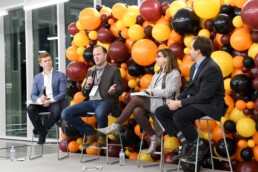Planner Profile: Q&A with Valerie Luporini
 Valerie Luporini is the Vice President of Corporate Events at Inland Communications, Inc. and a seasoned meeting and events professional that spans more than 25 years. Her expertise, creativity, and experience is admired by the planning industry and she has shared that insight with us! Check out our first Planner Profile below:
Valerie Luporini is the Vice President of Corporate Events at Inland Communications, Inc. and a seasoned meeting and events professional that spans more than 25 years. Her expertise, creativity, and experience is admired by the planning industry and she has shared that insight with us! Check out our first Planner Profile below:
What meetings and events trends do you see taking off in 2020?
Sustainability - I believe sustainability is becoming the norm in our industry instead of the exception. In the past, it was nice to see recycling bins at an event, it showed that the host cared about the environment. Now, I'm happy to say, attendees are expecting sustainability to be a priority. From full-service apps that create paperless events to zero-waste lunches this trend is being taken seriously.
Experience Based Events and Venues - Creating an event that offers a new experience to attendees is now necessary to hit registration goals. We're living in a world where I believe the average attention span is less than 8 seconds and everyone is looking for instant gratification and constant stimulation. A meeting in a hotel ballroom with classroom seating and a detailed PowerPoint presentation is no longer productive. Event spaces need to be unique and planners need to create an interactive experience to maximize audience engagement and content retention.
Mindfulness -Â I'm personally very excited about the mindfulness trend growing in our meeting and events industry. Whether it's a short meditation, group run or an entire platform for larger meetings, mindfulness is front and center and attendee feedback has been overwhelmingly positive. Helping the attendees disconnect from their everyday allows them to be more engaged.
What has been your biggest challenge in the meetings and events industry?
Working with tight budgets and short turnaround times has been a challenge throughout my career. More recently, my biggest challenge is finding new venues that can provide different experiences for my attendees.
What is your biggest career highlight?
I have been blessed with a great career and have planned hundreds of events over the past 30 years. The one that will always standout for me is an international board meeting. I was a young planner and was tasked with hosting a week-long board meeting for members and their guests. There were many components and challenges that came with this event. Not only was it an international meeting for an elite group but it had multiple sessions running simultaneously. Meeting content had to be developed, normal logistics had to be coordinated and managed and excursion options had to be offered. One of the highlights from that project was using a set of famous stairs as the venue for our black-tie event at the end of the program.
What is your best advice for a newcomer to the planner industry?
I always tell new planners to choose an industry that they are passionate about and develop their planning skills within that space. If they like health and fitness, they should find a company that can use their skills and plan within that world. A good planner can make their skills work in any industry but it's important to keep their passion alive. They should work in an industry they love.
How did you get started in planning meetings and events?
When I was 10 years old, I asked my mom if I could help with my little sister's birthday party. As soon as she said yes, I started planning. I came up with a theme, handmade all the invitations, worked on designing the event (made decorations), and enjoyed watching it come together on the day of her party. Although it was put on hold for several years, my passion was discovered.
I was hired by Cirrus, a division of MasterCard International, to assist the Vice President shortly after I graduated high school. One of the main components of my job was planning meetings and events. The passion that started when I was a kid came alive again. I immediately started planning domestic and international meetings as well as corporate events and marketing programs. Almost 30 years later, I still love what I do.
What tools or technology do you love that can help other planners?
I believe our relationships and the skills to develop them are the most important tools we have as planners. Technology is always changing, so the best advice I can give is to commit to working with peers and suppliers to help you stay informed.
If I had to pick one technology component, I'd say registration software. I have used a few throughout my career and now more than ever the process needs to be easy, quick and secure. It's important to spend the time to research the multiple products that are available and work with peers to choose the one that best fits the project and budget.
What is the most interesting event idea that you've heard about or implemented yourself?
I am amazed every day when I open my email and see all of the events that our peers produce. I recently attended Salesforce's annual Dreamforce conference and have to say I've never attended anything like it. Their attention to detail when planning the attendee experience was noticed and appreciated. They hosted over 170,000 registered attendees for this multi-day event and did it seamlessly. I loved the idea that they aligned it with their corporate core value of making a difference in the world and provided an environment that addressed the mindfulness trend through programing and extreme sustainability efforts. I felt that they provided an engaging, educational and entertaining experience that allowed each guest to maximize their experience and time out of the office.
What is the most important element to a meeting or event and why?
For me it will always be the overall attendee experience. Strong content doesn't mean a successful event. Time is our greatest commodity and with so many options we need to make sure we're hosting and attending events that offer the best return on our energy. If someone is taking time out of their busy schedule, they should be offered easy registration and an engaging event with an environment that makes it easy to retain the information that shared.
10 Event Trends for 2020
New decade, new trends! From innovative technologies to catering to a greater audience, the meeting and event planning space is rife with new ways to stand out. Here are 10 trends to keep an eye out for in 2020:
Innovative Eventtech
New registration tools are making events easier and more manageable onsite. Companies like ExpoPass eliminate the frustration of scanning tickets, looking up registration accounts, and even printing name badges.
App Adoption
App usage for events has significantly increase in the last year, and many event professionals see apps as an added value to the event. Having one place to provide site maps, distributed information, FAQs, and more makes navigating the event easier for both attendees and managers alike.
Offering a Tourist Attraction
Expecting out-of-towners to attend your event - Offering an offsite activity, day trip, or unique outing is attractive to registrants and will keep them coming back year after year.
Asking for Feedback
Gone are the days of a paper survey that may or may not get tossed in the trash. Digital post-event surveys through an event app or via email help planners increase feedback from both attendees and sponsors and make it easier to calculate analytics and find trends.
Charity Components
Creating an environment that unifies attendees and sponsors is key in making a memorable experience and more and more planners are implementing a charitable component to the events. Donation drives, offsite volunteering, and trips to witness local culture are more prominent.
Offering Exclusivity
Unique venues can make or break an event, and giving attendees an experience through location is on the 2020 horizon. Luxury resorts, cruise ships, and festival-style events are great ways to make your event a must.
Be Sustainable
The well-being of the environment is top of mind for 2020, and event planners will be making bigger strides in making their events more sustainable. Planners are considering sustainable transportation, recycling options, digital forms of paperwork, solar energy and more.
Make Decor Part Of the Interaction
Key placement of decor and furniture can actually help facilitate mingling and promote the ultimate goal of the event - networking and interaction! Filling large spaces with couches, tables, and even interactive games will be key to the ultimate comfort level of guests.
Cool Eats and Treats
Who doesn't love a fun ice luge or a beautiful carving station - Creating an "exhibit" with the food is a great way to add visual excitement to something you'd already have on site anyway. Interactive food stations like food trucks or build-your-own bars will also be making a splash in 2020.
Make It Personal
A draw for many is the locale itself and ensuring that your attendees have a taste of local culture is super-important. Sourcing local vendors for decor, transportation, and venue space can make all the difference in your event standing out, as well as local menus (Are you hosting an event in Chicago - Maybe one meal consists of local favorites like deep dish pizza and Italian beef!)
Cannabis Legalization and It's Effect on Event Planning
As we enter into a new decade, the legalization of marijuana continues to be a hot topic of discussion, particularly among meeting and event planners. As of January 1, 2020, Chicago has legalized marijuana and dispensaries are popping up all over the city. At PlannerPalooza in November, we were joined by experts in the cannabis industry who weighed in on how these new laws will affect planners, venues, and vendors. Here are three things to keep in mind when planning an event in a marijuana-friendly environment:
Know Local Laws
As it stands right now, 11 states have full-scale medicinal and recreational marijuana laws in place, while 33 states have legalized marijuana for medicinal purposes, according to panelist Donna B. More, Partner at Fox Rothschild LLP. Because there tends to be so much gray area with what is classified as medicinal or recreational, it is important to understand the local laws for the cities and states for the event you are planning. Hotels may not support the addition of a marijuana feature on-site, and you may need to acquire a license to host such an event said More. In addition to licensing, look into insurances that may be needed either at the venue or for a one-off event. Insurance companies are becoming increasingly more comfortable with insuring the marijuana industry. Also, understand the importance of signage and distributed information as local laws dictate; making health claims, for example, is typically illegal.
Consider the Overall Audiences
From attendees to your sponsors, make sure you know your audience inside and out when bringing on a weed feature at your event. Panelist Doug Lambert, Managing Partner at Scale Momentum, LLC noted that it's important to research other brands and sponsor representation prior to embarking on a marijuana feature or activation at the event since other brands may not be on board with the association of marijuana at the event. Panel moderator Ryan Crane, CEO of Tempo, said that the recent uptick in brands evolving into marijuana-friendly will almost certainly dictate a larger number of events that will house weed-based activations, particularly the food and beverage, retail, and cosmetic industries. Provide resources for your audience so that they can become aware of laws, regulations, and opportunities surrounding new legalizations.
Employ the Right People on Site
An event cannot function without a committed staff of employees to help with logistics. When bringing a weed activation or feature into the mix, it is important to have the right people in place to streamline legalities and any potential issues. To ensure that all bases are covered, More suggested teaming up with the venue to ensure that their general counsel okays the presence of a cannabis company on site (or any giveaways they may have), as well as signing on the lawyer of said company. She noted that cannabis companies also have a wealth of resources to keep themselves covered, and are often willing to provide those resources to partners.



